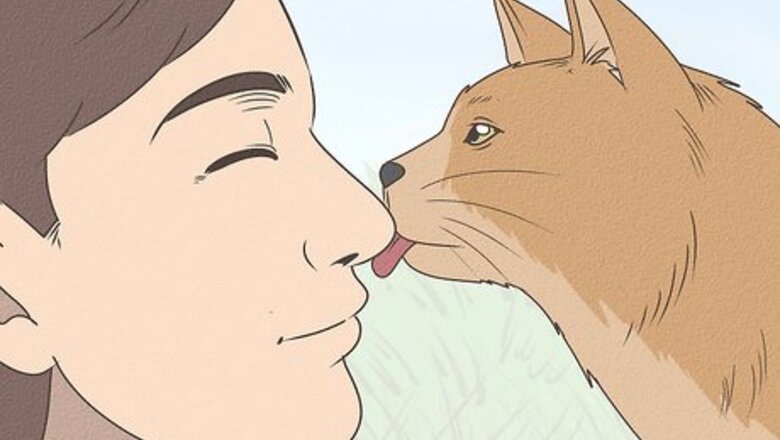
views
- Your cat might lick you to show you their affection, mark you as their territory, or to get your attention.
- Excessive licking, along with other signs like loss of appetite, might mean that your cat is in pain or discomfort.
- Stop your cat from licking you by distracting them with affection or fun toys, or by moving away from them when they lick you.
Reasons Why Your Cat Licks You
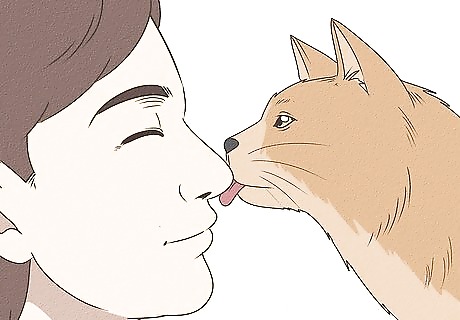
They love you. Cats lick and groom each other to show affection, and they often lick you for the same reason! A few kitty kisses as you're scratching your cat under their chin are a sign that they adore you and appreciate your love. When cats groom each other, also called allogrooming, they’re establishing and strengthening their bonds. If you’re honored with a lick from your cat, that’s also their way of reaching out and growing closer with you.

They’re marking their territory. A lick from your cat is often their way of claiming you and telling other cats that you’re theirs. You probably won’t be able to notice it, but their little licks transfer their scent on to you! This also makes you smell more familiar to your cat, which helps them feel more comforted. Your cat isn’t just marking their territory when they lick you. Transferring their scent onto you also makes you a part of their space, meaning that they trust you. Your cat also rubs their head on you to mark their territory. Their face contains pheromones, or scent-based chemicals, that they transfer onto you so you smell familiar to them.
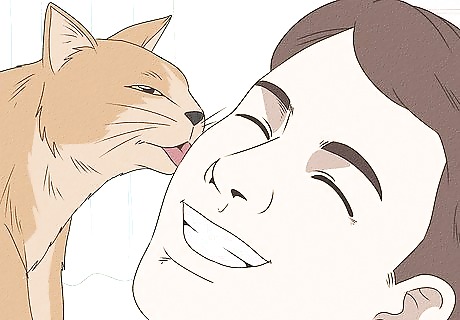
They’re grooming you. Your cat’s licks can be a sweet sign that they view you as a member of their family. Their mother taught them how to groom and they just want to return the favor and show you how to properly do it. So, their licks are their way of passing on their knowledge. If your cat has ever brought you a dead mouse, they weren’t just giving you a present. They’re trying to teach you something too! Leaving a dead bug or mouse is your cat’s way of teaching you how to hunt.

They like the way you taste. This might be an obvious reason, but your cat might lick you because something on you tastes good! Your cat might love the salt they taste from your sweat, or be attracted to a fragrant lotion you use. Some topical medical ointments, like hormone creams and steroids, can be dangerous for your cat to lick. If you use any topical medical ointments, talk to your vet to see if they are a concern for your cat.

They want your attention. A few rough licks with their sandpaper tongue is sure to turn your focus away from what you were doing and on to your kitty. This is their way of telling you that they want something, whether that’s another bowl of food, some head scratches, or a rousing game of chase the laser pointer.
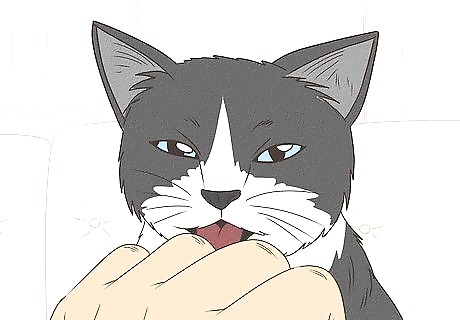
They were weaned too young. Your cat might lick you because they were taken away from their mother earlier than normal. Most kittens need to spend at least 8 weeks nursing from their mother. Nursing is incredibly comforting to kittens, so licking you might be their way to get the cozy feelings that they missed out on.
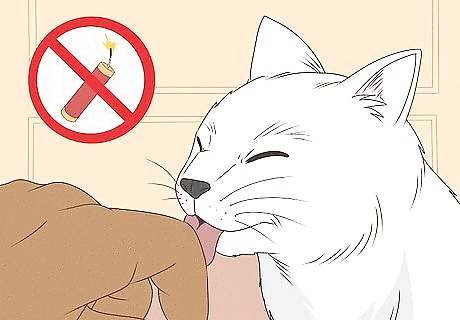
They’re relieving stress. Grooming is a common way for cats to self-soothe when they feel anxious. A loud noise or new visitor might be overstimulating and stressful for your cat. So, they might lick you in order to calm themselves down. To tell if this is the case, look at your cat’s body language. If they’re crouched and tense, they might be stressed out. When this licking happens, look for the trigger that’s stressing out your cat. Simply remove the trigger or your cat from the situation to keep them calm. If your cat continues to feel stressed, their self-soothing licking can sometimes turn into compulsive behavior. Over the counter products like Feliway and Zylkene can help reduce stress-related licking. However, if your cat continues to excessively lick, take them to the vet. To help your cat feel less stressed in your home, give them spaces that they feel secure in, like a cat tower or cat cave. Also make sure to give them affection and play with them for at least 15 minutes a day.
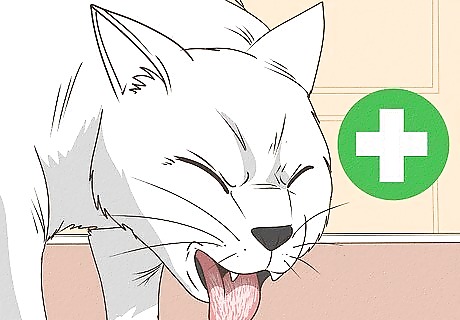
They’re in pain. Most of the time, your cat’s licks are completely normal. However, if your cat is licking excessively and it's a new behavior for them, they might be in discomfort. If their licking is also accompanied with other signs like irritability or a lack of appetite, schedule an appointment with your veterinarian. Your cat might be experiencing some nausea or dealing with a pesky internal issue like inflammatory bowel disease. If you're worried about your cat's health, your vet can help you get to the bottom of the issue.
Getting a Cat to Stop Licking You
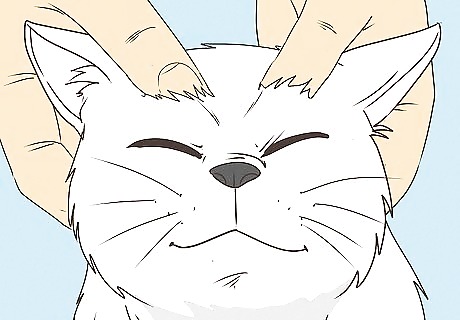
Distract your cat’s licking by petting or playing with them. While your kitty’s licks are cute, there are times when they start to feel unpleasant. When you’re ready for the licks to stop, give your cat a massage with your fingers or a brush. Or, distract them with a fun, stimulating toy like a cat teaser, laser pointer, or catnip mouse. Giving your cat a variety of toys is a great way to distract them and keep them stimulated. Keep 1 to 2 toys out at a time from your collection and rotate them so your cat stays interested and excited. Puzzle feeders are another great way to redirect your cat’s attention and give them a fun, mental task to solve.
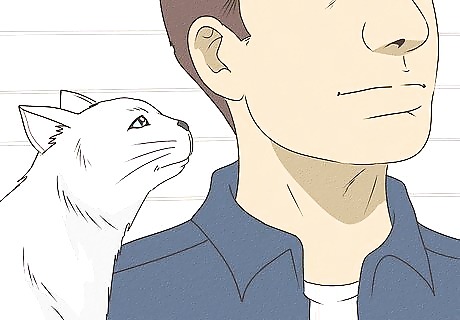
Teach your cat to stop licking by ignoring their behavior. If your cat’s licks are getting to be too much, stand up and move away when they lick you. When you cuddle them and they don’t lick you, be sure to give them lots of praise and extra pets. Over time, your cat will learn that they get affection when they don’t lick you, but you leave when they do. Do not yell or use punishments like spray bottles when you’re teaching your cat not to lick. This can damage your relationship with your cat because they’ll associate their discomfort with you.
Is it safe to let your cat lick you?
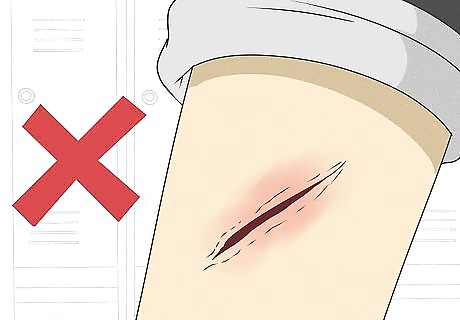
While licks are mostly safe, avoid letting your cat lick open cuts. Your kitty’s face might be sweet, but their mouth is full of bacteria. Though rare, their licks can cause an infection if they lick an open wound on your skin. Vets recommend against letting your cat lick your face, too. Your face can also be vulnerable to the bacteria in your cat’s mouth.
Why do cats’ tongues sometimes hurt?
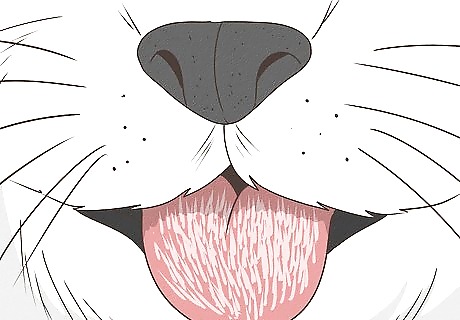
The roughness of a cat’s tongue comes from fibers called papillae. Cats’ tongues are specifically designed for grooming their fur. The sharp, backwards-facing papillae on their tongue comb through their fur to get to their skin and catch loose dirt and debris. While that certainly helps your cat get clean, it means their tongue can feel like sandpaper on your less furry body! It might come to no surprise that cats’ tongues are perfected for grooming. They spend almost 25% of their day cleaning their fur!
















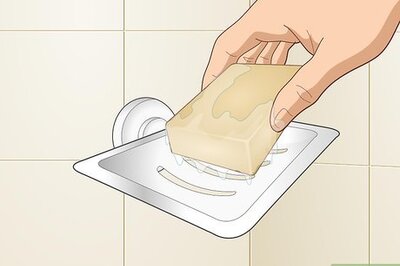
Comments
0 comment